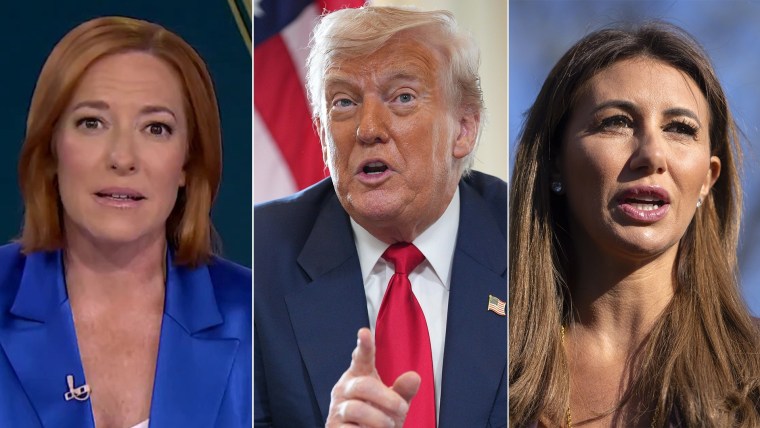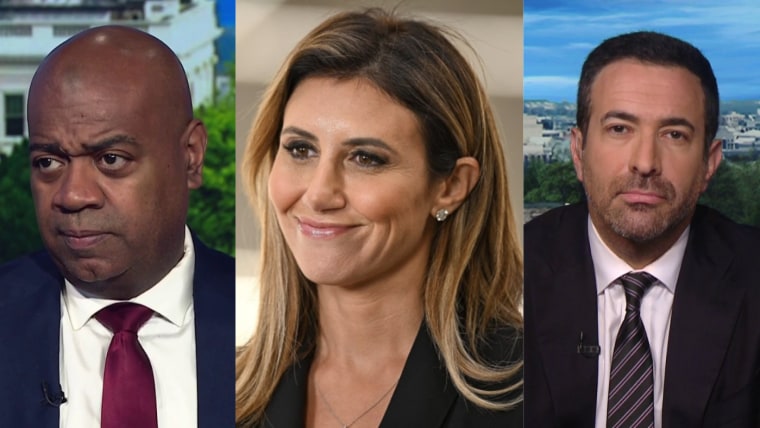Who is actually the U.S. attorney for New Jersey right now? That question has been on my colleagues’ mind especially after The New York Times reported that multiple court proceedings — including the convening of a new grand jury — were canceled in New Jersey federal courts Monday after former Trump lawyer Alina Habba, who had been serving in the role for a 120-day stint, was named again to fill the role on a longer, but still temporary, basis.
Based on a Wednesday night court filing — whether or not she is there lawfully — it seems clear that Habba is doing the job.
That filing — signed by Attorney General Pam Bondi; her deputy, Todd Blanche; Bondi’s chief of staff, Chad Mizelle; Habba herself; DOJ’s chief of criminal appeals; and the chief of the appellate unit of the U.S. Attorney’s Office for New Jersey — was made in opposition to a motion by defendants who are scheduled for an Aug. 4 trial to dismiss their indictment on the grounds that Habba cannot serve as acting U.S. attorney. (Barring an outright dismissal, the defendants have also asked for an injunction “barring Ms. Habba, or any Assistant United States Attorney acting under her purported authority, from exercising further prosecutorial powers in this matter.”)
The Federal Vacancies Reform Act would still seem to pose a problem for Habba.
The DOJ brief, on the other hand, says that Habba is “validly serving as the Acting U.S. Attorney” because of the following sequence of events: Bondi appointed her as first assistant U.S. attorney; “The First Assistant can serve as the Acting United States Attorney under the Federal Vacancies Reform Act when that office is vacant”; and “The President properly removed as United States Attorney an individual whom the District Court for the District of New Jersey purported to appoint.”
And interestingly, DOJ is supporting its position (and its timeline) with documents we haven’t seen before, including:
- Two orders, one through which Bondi first appointed Habba to begin serving on March 28 and a second from May that extended Habba’s term through July 25. Assuming these are valid, that means DOJ is correct that Habba’s 120-day term under the statute specific to U.S. attorney vacancies did not end on July 22, as we originally thought.
- A July 22 letter from the director of the Executive Office of U.S. Attorneys firing Desiree Grace, the judges’ choice for the job. That letter, like many other DOJ termination notices, simply states she is being removed from her position as an assistant U.S. attorney “[p]ursuant to Article II of the United States Constitution and the laws of the United States” and that she has been terminated from federal service “effective immediately.”
- Habba’s July 24 resignation as “Interim United States Attorney for the District of New Jersey,” which states, “I look forward to continuing to lead the U.S. Attorney’s Office for the District of New Jersey.”
- A July 24 order from Bondi appointing Habba as a special attorney and designating her as “First Assistant U.S. Attorney for the District of New Jersey, effective upon her resignation as United States Attorney for the District of New Jersey.”
- A July 24 letter from the Executive Office for U.S. Attorneys hiring Habba as a “Special Attorney to the United States Attorney General,” through which she “is authorized to conduct in the District of New Jersey, any kind of legal proceedings, civil or criminal, including Grand Jury proceedings and proceedings before United States Magistrates, which United States Attorneys are authorized to conduct” and will “report to, and act under, the direction of the United States Attorney General or her delegee.”
- An email from a political appointee in the Office of Presidential Personnel, sent minutes after midnight on July 26, informing Grace that she “may not lawfully serve as the U.S. Attorney for the District of New Jersey” because the judges’ appointment lacked authority and, in any event, the president is removing her.
- A similar July 26 letter from the general counsel of the Executive Office of the U.S. Attorneys informing Grace that not only had she been fired from the department days earlier, but that “even if the district court had the authority to appoint you as United States Attorney, I am informed that the President of the United States has removed you from that office today.”
So is that the end of this dispute? Trump and Bondi do, after all, appear to have covered all of their bases.

The Federal Vacancies Reform Act would still seem to pose a problem for Habba. That statute precludes someone from serving as an acting officer for a Senate-confirmed position if that person hasn’t been first assistant to the vacant office for 90 days or more and “the President submits a nomination of such person to the Senate for appointment to such office.” And here, not only was Habba the first assistant for only millisecond before being appointed as acting U.S. attorney, but her nomination to be U.S. attorney for the long haul was sent to the Senate on June 30 before Trump withdrew it on July 24. Some legal scholars, like Georgetown Law professor Steve Vladeck, have argued that Trump’s submission of Habba’s nomination to the Senate, despite its withdrawal, should preclude her from serving under the Vacancies Reform Act.
Whether or not Ms. Habba technically qualifies as Acting United States Attorney, the Attorney General has validly delegated to her the authority to supervise all pending prosecutions.”
DOJ filing
But don’t worry! Bondi et al. have a ready retort! In Wednesday’s brief, the government advanced a fallback position that, taken to its extreme, would allow them to avoid Senate confirmation for Trump's entire term. They argue that the “powers of a United States Attorney ... are not exclusive” and that by statute the attorney general can delegate the usual functions of a U.S. attorney to “‘any other officer, employee, or agency of the Department of Justice’ ... and may direct any Department officer ‘or attorney specially appointed by the Attorney General under law’ to ‘conduct any kind of legal proceeding, civil or criminal ... which United States attorneys are authorized by law to conduct.’”
In other words, Bondi, Blanche and Habba contend in the first place that Habba is the one, true acting U.S. attorney; but even if she isn’t, it doesn’t matter, because Bondi can delegate those responsibilities to people she alone hires and appoints! As another government filing puts it, “at bottom, this is a dispute over titles, not authority.”
And they have been open about this since their initial Wednesday filing: “Whether or not Ms. Habba technically qualifies as Acting United States Attorney, the Attorney General has validly delegated to her the authority to supervise all pending prosecutions and other matters in the USAO-NJ, subject in turn to the supervision by the Attorney General and Deputy Attorney General, both of whom are Senate-confirmed.”
So in a matter of months, we’ve gone from a Justice Department with a U.S. Attorney’s Office so independent that it was half-jokingly nicknamed “the Sovereign District” to the attorney general openly claiming the ability to displace any U.S. Attorney’s Office via the appointment of a so-called special attorney.
Count this as another nail in the coffin of DOJ’s post-Watergate independence.

